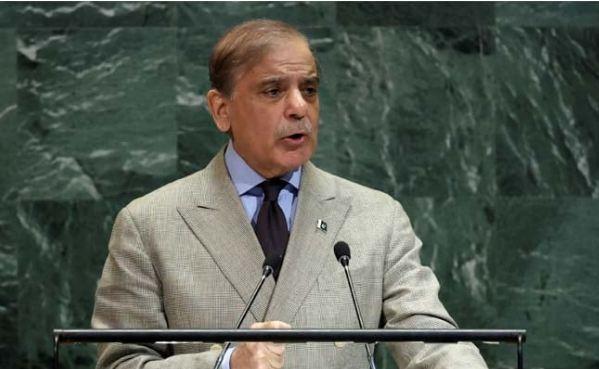Prime Minister Shehbaz Sharif delivered a forceful and well-received speech at the 79th session of the United Nations General Assembly (UNGA) on September 27. His address touched upon pressing global and regional issues, particularly those concerning the Muslim world, and drew attention to the plight of Gaza, the Palestinian struggle, and the ongoing injustices faced by Muslims worldwide. He also warned India against any aggressive posture on water disputes and condemned Israel for its attack on Qatar, underlining Pakistan’s principled stance on regional security and international law.
While the speech was widely appreciated in diplomatic circles, the question remains whether such international posturing can translate into relief and progress for Pakistan’s struggling citizens back home.
The Prime Minister was notably vocal on Gaza, denouncing Israel’s actions and calling for an immediate end to violence against Palestinians. He urged the international community to hold Israel accountable for what he termed “systematic aggression and violations of international humanitarian law.” His firm condemnation of the recent attack on Qatar further highlighted Pakistan’s solidarity with Muslim nations, underscoring Islamabad’s position as a defender of Muslim causes at multilateral forums.
Shehbaz Sharif also addressed the Kashmir issue, reiterating Pakistan’s long-standing demand for the right to self-determination for Kashmiris under UN resolutions. He cautioned India against any adventurism regarding water resources, stressing that tampering with water rights could destabilize the fragile regional balance.
These positions were well-received by many Muslim states and developing nations, who often look to Pakistan to articulate shared grievances at the global stage. Indeed, the speech projected Pakistan as a confident voice, ready to challenge injustices and raise concerns that larger powers often overlook.
Despite the power of Shehbaz Sharif’s address, the situation inside Pakistan paints a contrasting picture. At home, the government faces a deeply divided political landscape. Opposition parties complain of being sidelined, media organizations have raised alarms over censorship and pressure, and public trust in state institutions continues to decline.
Corruption, nepotism, and lack of meritocracy remain widespread. While the Prime Minister spoke of justice and fairness abroad, critics argue that ordinary citizens in Pakistan see little evidence of those principles in their daily lives. Unemployment, rising costs of living, and dwindling opportunities dominate conversations in markets and homes across the country.
The result is a widening gap between the government’s international image and its domestic credibility. While speeches at the UN can strengthen Pakistan’s diplomatic footprint, their impact on everyday Pakistanis remains negligible unless followed by concrete reforms at home.
The World Bank’s recent report on Pakistan’s economic situation paints a grim picture. According to the findings, poverty in the country has increased by nearly 7 percent, reflecting the mounting struggles faced by lower and middle-income households. This rise in poverty is not merely a statistic; it translates into millions of families unable to afford basic necessities like food, healthcare, and education.
The Pakistani rupee remains under pressure, with the inflated dollar exchange rate taking a heavy toll on businesses and consumers alike. Imported goods, fuel, and essential commodities have become significantly more expensive, feeding into a cycle of inflation that disproportionately affects the poor.
Moreover, foreign investment remains sluggish, and structural reforms needed to revive the economy have been slow in implementation. While the government claims to be working on stabilizing macroeconomic indicators, the ground reality for the average Pakistani is worsening.
One of the most significant criticisms facing the current government is its inability—or unwillingness—to address governance failures. Despite having full support from the establishment, as many analysts point out, the government has yet to demonstrate strong resolve in tackling corruption, reforming institutions, or promoting merit-based decision-making.
This lack of accountability fuels public disillusionment. Citizens feel that the ruling elite, regardless of political party, often protect their own interests rather than prioritizing national welfare. While Shehbaz Sharif’s speech at the UNGA may project Pakistan as a nation standing tall on global issues, at home many perceive the leadership as disconnected from the harsh realities of ordinary life.
The contrast is stark: abroad, Pakistan speaks of justice, rights, and fairness; at home, citizens feel trapped in a cycle of corruption, inequality, and misgovernance.
For decades, Pakistani leaders have pointed to constraints, including lack of support, political instability, or external pressures, as reasons for poor governance. However, critics argue that this government enjoys unprecedented backing from the establishment and cannot afford to hide behind excuses.
The question then is: with power firmly consolidated, what prevents the leadership from delivering meaningful change? The onus is now squarely on Shehbaz Sharif and his team to prove that they can translate political stability into economic recovery, governance reforms, and tangible improvements in people’s lives.
Without such action, even the most eloquent speeches on international platforms will fail to resonate with citizens at home.
Pakistan stands at a crossroads. On one hand, the Prime Minister’s strong articulation of Muslim world concerns at the UNGA has reinforced Pakistan’s diplomatic profile and showcased its commitment to just causes. On the other hand, the mounting domestic crises—economic instability, growing poverty, political repression, and governance failures—demand urgent attention.
The government must focus on delivering relief to ordinary citizens by addressing inflation, stabilizing the currency, and creating jobs. Simultaneously, it must restore faith in institutions by promoting transparency, ensuring accountability, and safeguarding the independence of the media and judiciary.
Only then will Pakistan’s international standing be complemented by domestic credibility. Speeches, however powerful, cannot substitute for effective governance.
Prime Minister Shehbaz Sharif’s address to the UN General Assembly was undoubtedly impressive, commanding attention on issues ranging from Gaza to Kashmir, Israel to India, and the broader challenges confronting the Muslim world. His words resonated with many nations and reflected Pakistan’s long-held positions on critical matters of justice and peace.
Yet, back home, the situation remains bleak. Poverty is rising, the economy is struggling, governance is weak, and public trust is eroding. With full authority at its disposal, the government no longer has the luxury of excuses. The true test of leadership lies not in speeches abroad but in delivery at home. Unless concrete steps are taken to address the plight of common people, the disconnect between Pakistan’s global voice and its domestic reality will only deepen.

















